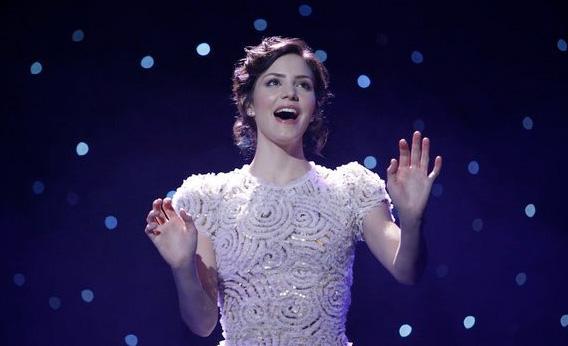You cannot have avoided hearing about Smash (NBC, Mondays at 10 p.m. ET). NBC has been running ads during NFL games, reminders in its chyron, teasers in taxis, spots in Playbill; at this point, even people who do not own televisions may feel that the network bought airtime in their REM sleep. Just as the series, with its cameos by Broadway machers and its fond peeks inside theater haunts, is pitched at both residents of the entertainment world and the good people of Peoria, these promotions serve two constituencies. One is composed of the civilians who may yet be pummeled into watching this soapy musical about a Broadway musical—soap as dispensed by the bathroom attendant at Sardi’s. The other is “the creative community.” The second group, lingeringly cheesed off by the network’s 2009 move to crowd drama out of primetime in favor of Jay Leno, need convincing that NBC is committed to attempting classy, smart work for adults. Even if the show fails commercially, the peacock will have smoothed some feathers.
The classiness is evident in the roster of behind-the-scenes talent, which includes the writers of the musical Hairspray, the producers of Chicago, a co-producer of NYPD Blue, and some guy named Spielberg. In front of the scenes, the class is extreme. Check the intelligence of the lyrics, the opulence of the domestic interiors, and the rich wool of the long sweaters swaddling the frame of Debra Messing, who is very appealing as one half of a writing team. On one level, watching Smash is a bit like going home after seeing a Broadway show—like humming the catchiest tunes as you drive back to Short Hills in your Lexus, with two or three dusky-violet Bergdorf bags sitting plumply in the trunk.
Will Smash hit? I won’t presume to say; only a few people know less about programming a network than I, and NBC has already dismissed them. But there can be no question that the marketing department erred in sending out the first four episodes for review (in, by network standards, an uncommonly glossy promotional booklet). The pilot and the second episode were good full meals, with wit and sex to the musical numbers and coherent characterizations. As writers attempting a Broadway musical about Marilyn Monroe, Messing and Christian Borle bantered beautifully, and if Messing has better chemistry with Borle than with her on-screen husband, well, that felt about right.
The duel between the actresses auditioning for the Monroe role proves immediately engaging, despite the fact that heroine Katharine McPhee—regardless of her big, warm voice—has too meager a screen presence to be credible as an ingénue, much less a sex bomb. But her rival, played by Megan Hilty, has the brass and the sass that you expect from a creature of the Great White Way, perhaps because she is one. Jack Davenport plays the director eager to offer either of these women a position in the show—maybe the one who assumes other positions first.* The show, in love with showbiz even in its seediness, is not strictly censorious of the casting couch.
As the producer looking to jump-start an independent career while divorcing her husband, Anjelica Huston is lovely and rageful, using her bird-of-prey profile to fantastic effect. But her character is a victim of the cartoon vibes and copious suds that creep over the series in its third and fourth episodes. Huston keeps running into her soon-to-be-ex-husband in public and keeps throwing her drink in his face. By my count, she’s wasted at least 12 ounces of whiskey in humiliating the guy. It’s a running joke that fast runs dry—and an illustration of why it’s always a good idea to order a glass of water alongside one’s cocktail.
Worse, Huston instigates a set piece that it is impossible to take seriously, or any other way. Many of the musical numbers in Smash deny skeptics and cynics an opportunity to snicker at their unreality. The jumping-off points are auditions, rehearsals, karaoke nights, or else moments of heightened emotion at the edges of the episodes. The lyrics enrapture, the Fosse-ish choreography transports, and it’s all good. Then the show rudely detaches itself from reality in the fourth episode: At a party, Huston arranges an impromptu showcase of one number to impress a potential backer, played by a Jonas brother. Despite not having heard the number before, the Jonas jumps in for the last verse, holding his guitar in an Elvis-y stance and his head at a showboat posture. The show breaks its own rules, and the mood shatters.
Reportedly, if Smash takes off, then the fictional musical being created within the series will become an actual musical on Broadway. I would gladly pay $75 for an orchestra seat to see the show-within-a-show. The way things are going, I would pay $100 if the purchase exempted me from having to watch any more of the show itself. I’d like to think that the show will turn itself around, and I wonder how much time the audience will give it to do so. I’m thinking of the moment in All About Eve when Marilyn’s character—an aspiring actress who studied at “the Copacabana School of Dramatic Art”—wobbles defeated out of a Broadway audition and into the paws of her patron, the critic Addison DeWitt. He suggests that she lower her sights and pursue work on the small screen. “Do they have auditions for television?” she asks. The answer? “That’s all television is, my dear, nothing but auditions.”
Correction, Feb. 6, 2012: This article originally misidentified the actor who plays the director in Smash as Derek Wills. The character’s name is Derek Wills, the actor’s name is Jack Davenport. (Return to the corrected sentence)
